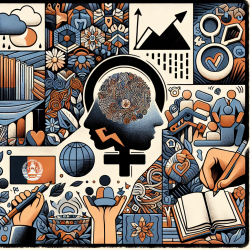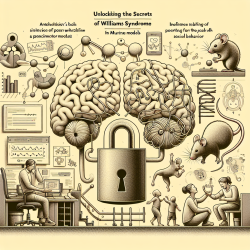Introduction
In the realm of special education and therapy, understanding the broader socio-economic and cultural contexts that influence students' lives is crucial. The research article titled "The impacts of combined social and economic empowerment training on intimate partner violence, depression, gender norms and livelihoods among women: an individually randomised controlled trial and qualitative study in Afghanistan" offers valuable insights that can be applied to enhance the skills of practitioners working in diverse educational settings.
Research Overview
The study conducted in Afghanistan aimed to assess the impact of the Women for Women International (WfWI) program, which combines economic and social empowerment interventions. The primary goal was to determine whether these interventions could reduce intimate partner violence (IPV) and depression among women. Although the study found no significant impact on IPV or depression, it highlighted improvements in livelihoods, gender-equitable relationships, and women's mobility.
Key Findings and Implications for Practitioners
- Economic Empowerment: The study found that women in the intervention reported higher earnings and savings. Practitioners can leverage this finding by integrating economic empowerment components into therapy programs, encouraging students and families to explore vocational skills and financial literacy.
- Social Empowerment: The research indicated a shift towards more gender-equitable attitudes and increased household decision-making among women. Practitioners can incorporate social empowerment themes in their sessions, promoting gender equality and decision-making skills in students.
- Mobility and Independence: Increased mobility was reported among women in the intervention. Practitioners should encourage students to explore and engage with their communities, fostering independence and self-reliance.
Encouraging Further Research
The study underscores the need for further research to translate economic and social gains into reductions in IPV and depression. Practitioners are encouraged to engage in research initiatives that explore the integration of empowerment strategies within educational and therapeutic settings. Collaborating with researchers can provide valuable data and insights to refine and enhance intervention programs.
Conclusion
The findings from this study offer a foundation for practitioners to incorporate economic and social empowerment strategies into their practice. By fostering skills that promote independence, gender equity, and financial literacy, practitioners can contribute to the holistic development of students and their families. For those interested in delving deeper into the research, the original paper provides a comprehensive analysis of the intervention's outcomes and implications.
To read the original research paper, please follow this link: The impacts of combined social and economic empowerment training on intimate partner violence, depression, gender norms and livelihoods among women: an individually randomised controlled trial and qualitative study in Afghanistan.










